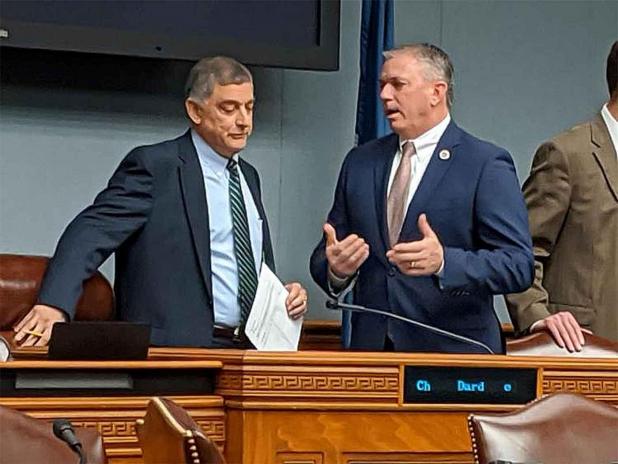
Commissioner of Administration Jay Dardenne, left, speaks with House Speaker Clay Schexnayder.
The Center Square/David Jacobs
Governor faces a more conservative Legislature
Democratic Gov. John Bel Edwards on Monday addressed a group of lawmakers who may be more conservative and more independent of the governor than ever.
Republicans hold a veto-proof supermajority in the state Senate and are only two seats short of that two-thirds threshold in the House of Representatives. Former Senate President John Alario, a Democrat-turned-Republican who often was an Edwards ally, was forced out by term limits and replaced by Lafayette Republican Sen. Page Cortez.
Rep. Clay Schexnayder, an Ascension Parish Republican, was elected House speaker when the minority Democrats voted for him as a block. But while some conservatives worry he will be beholden to Democrats and the governor, Schexnayder stood with Cortez to block the administration’s preferred revenue projection for the coming fiscal year.
The state still doesn’t have an official revenue projection, which dictates how much money lawmakers have to spend. But both sides say they expect to have one soon and express optimism about being able to work together. Edwards has even suggested the large crop of new lawmakers might be more receptive to some administration initiatives that were shot down during the last term, such as raising the minimum wage.
“I do believe there is plenty of common ground,” Edwards said recently.
Cortez, for his part, says he would prefer to send Edwards bills the governor would be willing to sign, rather than trying to override vetoes.
This year’s regular session is non-fiscal, which means legislators cannot raise taxes. But there are still plenty of potentially divisive issues that could test the limits of bipartisanship, including:
Legal climate
Tort reform, which this session means changing the civil justice system to limit the ability to file lawsuits or restrict the amount of money a plaintiff can receive, is the top priority for the state’s business lobby and many Republicans who say it could improve the state’s economy. Democrats tend to be more skeptical, saying such changes benefit big business while limiting citizens’ access to the courts.
Under current law, a civil case has to be worth at least $50,000 to guarantee a jury trial, by far the highest threshold in the nation. Several bills would reduce or eliminate the threshold or expand the types of evidence admissible in court. Another would limit civil damages to $500,000.
Rep. Raymond Garofalo, a Chalmette Republican, has filed a wide-ranging bill that would make multiple changes to the state’s legal system that proponents say could lead to lower automobile insurance rates, which in Louisiana are among the highest in the nation. But Sen. Barrow Peacock, a Republican who represents the Shreveport-Bossier City area and chairs a Senate judiciary committee, says he would rather consider bills that address one issue at a time.
Auto insurance
Lawmakers wary of tort reform are taking on the auto insurance directly, seeking to stop insurance companies from basing rates on factors other than safe driving. Edwards is backing three bills by Sen. Jay Luneau, an Alexandria Democrat, that would ban using credit score, military deployment, or status as a widow or widower as risk factors.
Spending
Rep. Rick Edmonds, R-Baton Rouge, wants to restrict state spending to 98 percent of the official revenue forecast. A similar effort failed during the last term. Proponents say the change would provide some room for error, since revenue tends to be unpredictable, while opponents note that lawmakers already are free to appropriate as little or as much of the official forecast as they want.
Other measures would prevent lawmakers from spending unclaimed property money, limit the amount of spending growth allowed from one year to the next, and restrict the use of state capital outlay dollars for local projects.
Wages
Several bills seek to establish a state minimum wage that is higher than the federal minimum of $7.25 per hour. Edwards is backing one that would establish a $10 minimum and tie future increases to inflation, while the most ambitious bill filed so far would increase the minimum to $15 an hour over time.
The governor also wants to guarantee employees’ right to discuss their pay and ban employers from asking about pay history in hopes of combating pay discrimination and closing the wage gap between genders.
Efforts to establish a state minimum wage, which proponents say would benefit the working poor while reducing the need for public assistance and boosting the state’s economy, have been shot down repeatedly in recent years. Business lobbyists say the change would hurt low-skilled workers by making them more expensive to employ and object to what they see as government interference in the private sector.
Taxes
Several bills would tweak the state’s controversial property tax break for manufacturers or establish new tax incentives. Some lawmakers want to prevent the Department of Transportation and Development from using gas tax revenue for employee salaries. Schex-nayder and Cortez both support establishing a single sales tax collector for the entire state, rather than allowing local officials to continue collecting their own taxes.
Marijuana
Though it’s a long shot, voters may get a chance to legalize marijuana for recreational use in their parishes or statewide. Smokeable pot may also be added to the list of the types of cannabis permitted through the state’s medical marijuana program.
